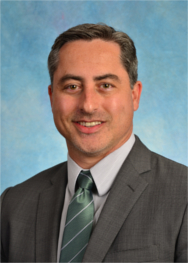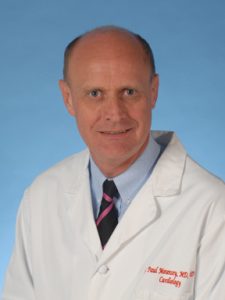
Brian Jensen, MD
Dr. Brian Jensen’s clinical and investigative efforts focus on heart failure. The Jensen lab uses animal and cell culture model systems to study the mechanisms of heart injury that lead to the clinical syndrome of heart failure.
Dr. Jensen has brought clinical questions from the UNC Heart Failure clinic to the lab. First, Dr. Jensen’s lab is studying the therapeutic potential of an alpha-1A adrenergic receptor agonist drug for the treatment of heart failure. This drug, developed by Roche for the treatment of urinary incontinence, has already been shown to be well-tolerated in Phase II clinical trials. Dr. Jensen has found that this drug protects the heart in two different mouse models of heart failure and identified novel mechanisms leading to improvement in cardiac function, which include novel and protective effects of alpha-1A activation on cardiac metabolism. The work has resulted in a provisional US patent, and a small company (AdrenaRx) to advance the drug development concept.
Dr. Jensen has also brought clinical questions from the UNC Cardio-oncology clinic to the lab. In a translational project in collaboration with Gary Johnson and Tim Stuhlmiller in the Department of Pharmacology, Dr. Jensen’s lab considers potential cardiotoxicity of a new anti-kinase inhibitor class of cancer drugs. They have characterized this toxicity in mouse models and hope this work will lead to the development of a platform for predicting cardiotoxicity of novel kinase inhibitors before they reach broad clinical use.
Dr. Jensen also collaborates with Dr. Monte Willis in the Department of Pathology and Laboratory Medicine and Greg Hundley of Wake Forest University Division of Cardiology on a project investigating the role of the ubiquitin ligase MuRF1 in the cardiac response to anthracycline exposure in mice and humans.
Ongoing research also includes that of Dr JuYoun Beak, a postdoctoral fellow in the lab on cardiac hypertrophy. Dr. Beak discovered that the orphan nuclear receptor, ROR-alpha, is expressed in the mouse and human heart and mediates cardiac hypertrophy in response to angiotensin II.
Patricia Chang, MD, MHS, FACC

Dr. Patricia P. Chang is Director of the UNC Heart Failure and Transplant Program who was recruited to UNC to build and direct the inpatient Heart Failure and Transplant Service. Her clinical practice is focused on heart failure, including cardiac transplantation and mechanical circulatory support, and echocardiography.
Dr. Chang has a Masters in Health Sciences in clinical epidemiology and holds an adjunct appointment in the Department of Epidemiology at the UNC School of Public Health. Based on her long-standing interest in the epidemiology of cardiovascular disease in general and heart failure specifically, she has been actively involved in multiple clinical and epidemiology studies. She currently serves as a co-investigator and the Chair of the Heart Failure committees of the NIH-sponsored Atherosclerosis Risks in Communities (ARIC) Study. Her work with colleagues in the ARIC Study has enriched the understanding of the epidemiology of heart failure, including its risk factors, outcomes and trends. She has also been the site principal or co-investigator for multicenter trials in heart failure, including the NIH-sponsored WARCEF Study and various treatment-based studies. Her clinical investigation in heart failure and cardiac transplantation have included a cohort study to study cardiovascular health in women during pregnancy, and local and national registries of patients to investigate outcomes in recipients of heart transplant and ventricular assist devices. Her collaborations with local colleagues have focused on improving the care of heart failure patients through various interventions to improve health outcomes, including self-care interventions in patients with low literacy skills, coping skills intervention, and engaging family members.
She is also Program Director for the Advanced Heart Failure and Transplant Cardiology subspecialty fellowship. She is an active member of several professional organizations, including the American Heart Association and the International Society of Heart & Lung Transplantation.
Listen to Dr. Chang’s podcast recording with Dr. Falk on heart failure.
Xuming Dai, MD, PhD, FACC, FSCAI
Dr. Xuming Dai, an interventional cardiologist, is an active member of McAllister Heart Institute. He obtained a PhD degree in Medical & Molecular Genetics in SMMU after medical school, with thesis research to establish a Hemophilia B mouse model to study an embryonic stem cell gene targeting approach. Post-doctoral research training in the laboratory of Dr. E. Richard Stanley’s laboratory at the Albert Einstein College of Medicine studied the biology of macrophage colony stimulating factor and its receptor by establishing and characterizing transgenic and gene knockout mouse models. Dr. Dai joined UNC in 2008 as a NIH T32 research fellow in cardiovascular medicine studying the role of endothelial nitric oxide synthase (eNOS) in collateral vessel development with Dr. James Faber in the Department of Molecular and Cellular Physiology.
As a faculty member, Dr. Dai’s primary expertise and interests are coronary heart disease both in his clinical practice, where he performs high risk coronary interventions and in his clinically based research in quality of care and outcomes in patients with acute myocardial infarction (AMI). He is interested in AMI in special populations, such as patients hospitalized for non-cardiac conditions, the elderly, and patients with spinal cord injury. In an observational study of ST Elevation Myocardial Infarction (STEMI) in inpatients, Dr Dai and colleagues found thatinpatient STEMI patients have 10 fold higher mortality, compared to outpatient STEMI. Recognition and diagnosis of inpatient events were delayed, resulting in less timely treatments. With the support of the Division of Cardiology, a quality improvement program was designed and implemented and has already resulted in improved quality of care for inpatient STEMI patients at UNC Hospital. Dr. Dai and his colleagues are now organizing a multi-center quality improvement program to gather evidence and promote this program.
Dr. Dai is passionate in advancing his basic science research program. In the last 3 years, Dr. Dai’s group has focused on understanding the molecular response in vascular endothelial cells to elevated inorganic phosphate (Pi), and its role in hyperphosphatemia induced vascular calcification as might be seen in renal failure. Applying transformative “-omics” approaches, such as transcriptomics by Affymetrix gene expressions, proteomics by 2D-DIGE and mass spectrometry, and metabolomics by NMR, they have begun characterizing the molecular blueprints of endothelial cells after exposure to hyperphosphatemia. Novel findings suggests that Pi transporters may localize to nuclear membranes to regulate intracellular homeostasis of phosphate. These studies have been supported by NC TraCS pilot grand and RTI Metabolomics Research Core pilot and feasibility award.
Dr. Dai is involved has a clinical interest in cardiovascular genetics and provides genetic consultation to patients with inheritable cardiovascular conditions in the cardiovascular genetics clinic (in association with Dr. Jensen.) Dr. Dai is particularly interested in understanding the genetics of in-stent restenosis, and atherosclerotic coronary artery disease and myocardial infarction. He has an ongoing projected aimed at identifying protective factors against the development of coronary heart disease in by studying high risk patients who don’t develop atherosclerosis.
Dr. Dai is also Medical Director of Nash Heart Center of UNC Nash Healthcare System.
Jason Katz, MD, MHS

Dr. Jason Katz is an advanced heart failure and transplant cardiologist, as well as a critical care specialist at UNC dually-appointed in the Divisions of Cardiology and Pulmonary/Critical Care Medicine. He serves as Medical Director of the UNC Cardiac Intensive Care Unit (CICU), the Cardiovascular and Thoracic Surgical Intensive Care Unit (CVT ICU), and the Mechanical Heart Program.
Dr. Katz clinical research studies have focused on several key areas: 1) Optimal Care Delivery Platforms for Critically Ill Cardiovascular Patients, 2) Novel Therapies and Best Practice Principles for Patients with Left Ventricular Assist Devices, and 3) Management of Individuals with Cardiogenic Shock and following Cardiac Arrest. Dr. Katz has served on numerous clinical trial Steering Committees, playing a key role in designing multicenter trials aimed at addressing care gaps in the management of patients requiring mechanical circulatory support devices for end-stage heart disease. He is particularly committed to eradicating disparities and variations in care that could potentially undermine the benefits of novel medical technologies. This includes standardizing processes in the cardiovascular intensive care units through multi-institutional, collaborative research.
Dr. Katz admits that he most enjoys tackling research topics where a robust evidence-base fails to exist, and asking simple questions with potentially large implications for patient care. He recently published a collaborative paper highlighting the genesis, maturation, and challenges that face the fledgling field of Critical Care Cardiology. Dr. Katz also supports other investigators in the Division of Cardiology in his role as Director of the Cardiovascular Clinical Trials Group.
Paul Mounsey, BM, BCh, PhD, MRCP, FACC

The cardiac electrophysiology group at UNC is a collaborative group consisting of Drs. Paul Mounsey, Anil Gehi, Eugene Chung, James Hummel, and Ross Simpson. They work alongside their interventional nurse practitioner group including Kim Guise, Connie Fecik, Jennifer Walker, Gail Ho, and Tiffany Thompson. Irion ‘Chip’ Pursell is the Research Coordinator. This group works collaboratively on multiple research projects.
The SUDDEN Study considers sudden death, the most common cause of death in the USA. In the past, it has been restrictively defined by timing and witnessing, and most victims are not recognized using the current classification criteria. The SUDDEN study aims to identify all victims of out of hospital sudden unexpected death (OHSUD), initially in North Carolina, but subsequently expanding to the South East and nationally.The OHSUD population includes all victims of sudden cardiac death as currently defined, but also includes the much larger group of sudden death victims missed by the accepted definitions. The OHSUD population has not previously been studied. In collaboration with members of the school of public health, notably Dr. Bradley Layton, Dr. Mounsey’s group has developed methodology to identify OHSUD victims and is beginning to study the epidemiology of the syndrome. Their ultimate goal is to identify the risk factors for OHSUD with a view to initiating prevention strategies in high-risk communities. Prevention is the only possible intervention that will impact the syndrome because most victims will never be candidates for resuscitation. This study is expanding rapidly including collaborations with the CDC and the EPA.
Spearheaded by Dr. Anil Gehi, the AF ED study attempts to avoid hospitalization for atrial fibrillation patients who present to the emergency room. By means of a management protocol developed with the ED physician group, low risk patients receive initial heart rate control and anticoagulation where appropriate. Patients are discharged and seen in a next day clinic staffed by the cardiologists and pharmacists. Patients have disease management strategies initiated and where appropriate are referred on for subspecialist management, or back to their primary care physicians. Initial results from this care pathway have been encouraging in that admission rates are down. Current plans involve a multi-center effort across UNC affiliated hospitals to test the management strategies pioneered here in more diverse medical environments.
In a major effort led by Dr. James Hummel in collaboration with researchers at Yale, the investigative group is examining the mechanisms of atrial fibrillation at the tissue level. Using detailed dynamical analysis of atrial fibrillation signals recorded at the time of catheter ablation, they will attempt to determine sites for catheter ablation specific to individual patients to terminate arrhythmias. Currently accepted techniques are largely anatomical “one-size-fits-all” approaches; targeted strategies tailored to each patient, based on this research and similar studies, should result in ablation procedures with better outcomes and lower morbidity.